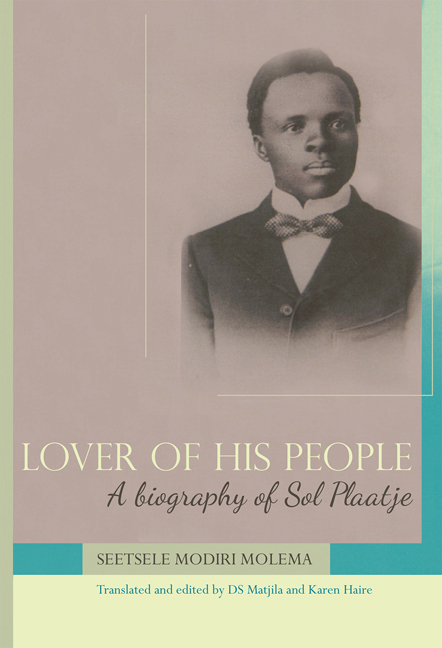Book contents
- Frontmatter
- Contents
- Acknowledgements
- Preface
- Foreword: Seetsele ModiriMolema: A star
- Chapter One First Encounter and Acquaintance
- Chapter Two Early Days and Youth
- Chapter Three An Unforgettable Year: 1896
- Chapter Four Life's Challenges
- Chapter Five Plaatje, The Career Journalist
- Chapter Six Government News
- Chapter Seven Conventions and Writings
- Chapter Eight Delegations and Meetings
- Chapter Nine Last Meetings and Travels
- Chapter Ten The Last Encounter
- Chapter Eleven Plaatje in His Own Words: English Extracts
- Chapter Twelve Plaatje in His Own Words: Setswana Extracts
- Seetsele Modiri Molema of the Mahikeng Molemas
- Bibliography
Chapter Six - Government News
Published online by Cambridge University Press: 16 March 2018
- Frontmatter
- Contents
- Acknowledgements
- Preface
- Foreword: Seetsele ModiriMolema: A star
- Chapter One First Encounter and Acquaintance
- Chapter Two Early Days and Youth
- Chapter Three An Unforgettable Year: 1896
- Chapter Four Life's Challenges
- Chapter Five Plaatje, The Career Journalist
- Chapter Six Government News
- Chapter Seven Conventions and Writings
- Chapter Eight Delegations and Meetings
- Chapter Nine Last Meetings and Travels
- Chapter Ten The Last Encounter
- Chapter Eleven Plaatje in His Own Words: English Extracts
- Chapter Twelve Plaatje in His Own Words: Setswana Extracts
- Seetsele Modiri Molema of the Mahikeng Molemas
- Bibliography
Summary
UNION OF SOUTH AFRICA
Since the days of the mass Boer migration from Cape Colony, known as the Great Trek, South Africa had been divided into four political entities, the two British colonies of the Cape and Natal, and the two Boer republics of the Transvaal and the Orange Free State. Each had its own government under a governor or president, its own parliament, its own defence force and its own railway service, etc. Collectively, white people numbered about 1.25 million, but each government was an independent entity, for they were separated by suspicion, distrust and a long history of strife between English and Boer.
In 1858 the wise Cape Colony governor, Sir George Grey, attempted in vain to unite the four governments. Shortly thereafter, in 1877, Lord Carnarvon, British colonial secretary, also attempted unification but his efforts were also fruitless. Soon thereafter, between 1885 and 1895, the mining magnate Cecil John Rhodes attempted the same and he might have succeeded had he not participated in the abortive Jameson Raid. His friend Dr Starr Jameson attacked the Transvaal and was defeated, but the raid led eventually to the Anglo Boer War in 1899.
Late in 1907, the high commissioner for South Africa, Lord Selborne, wrote a letter to the four provincial governments advising of the disadvantages, but also highlighting the advantages, that unification could bring to them. He warned that if they delayed unification the progress of the four entities would be hampered in many spheres. The leaders of the four governments eventually understood the wisdom of Lord Selborne's words. In 1909 the National Convention was convened to explore the possibilities of forming a Union government. The leaders came together and agreed on Union. The unification of Cape Colony, Transvaal, Natal and the Orange Free State was officially ratified at the National Convention in 1909.
Black people who lived in Cape Colony had had the same rights as their white countrymen but the Union of South Africa meant that they were in danger of losing their voting rights. These fears were expressed by black leaders, their white friends, missionaries and many other advocates of justice across the country and abroad.
Plaatje, with his knowledge of the laws of the Transvaal and the Orange Free State, had written with insight and foresight about what would happen to Africans if they were governed by the Boer laws.
- Type
- Chapter
- Information
- Lover of his PeopleA biography of Sol Plaatje, pp. 50 - 65Publisher: Wits University PressPrint publication year: 2013



